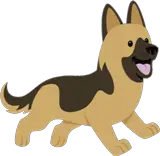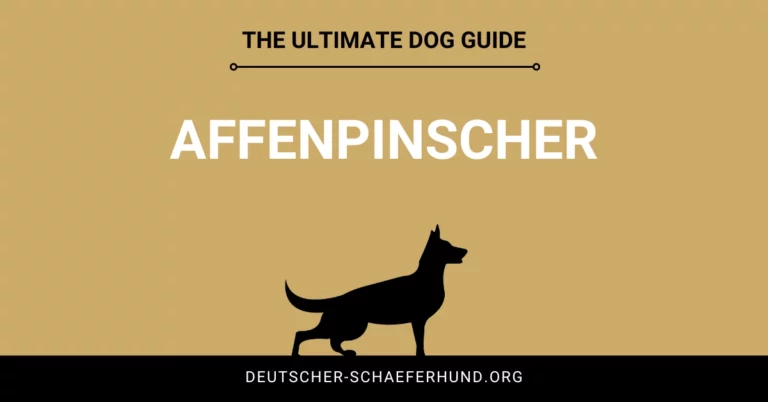Overview of the Affenpinscher breed
Affenpinschers, also known as “monkey dogs” due to their unique appearance, are a small and feisty breed with big personalities. In this guide, we will explore everything you need to know about this fascinating breed, from their physical characteristics and temperament to grooming and training.
Origin and history
The Affenpinscher is an ancient breed that originated in Germany, dating back to the 17th century. Initially bred as ratters in homes and stables, these little dogs later became popular as companion pets for their charm and loyalty.
| Attribute | Description |
|---|---|
| Breed | Affenpinscher |
| Origin | Germany |
| Size | Small |
| Height | 9-12 inches at the shoulder |
| Weight | 7-13 pounds |
| Lifespan | 12-15 years |
| Coat | Dense, rough, and wiry |
| Colors | Black, gray, silver, red, beige |
| Temperament | Lively, curious, affectionate, loyal |
| Trainability | Intelligent but can be stubborn |
| Exercise Needs | Moderate |
| Grooming Requirements | Regular brushing, professional grooming |
| Health Issues | Hip dysplasia, patellar luxation, heart problems, respiratory issues |
| Diet | High-quality dog food, adjusted for age, size, and activity level |
| Living Environment | Adaptable to various environments, including apartments |
| Activities | Agility, obedience, rally, and other dog sports |
| Good with Children | Better with older children due to small size |
| Good with Other Pets | Generally good, but may chase smaller animals due to prey drive |
Affenpinscher Physical Characteristics
Size and weight
Affenpinschers are small dogs, typically standing between 9 and 12 inches tall at the shoulder and weighing between 7 and 13 pounds. Despite their small stature, they are known for their sturdy and muscular build.
Coat and color
The Affenpinscher’s coat is dense, rough, and wiry, giving them a shaggy appearance. Their fur can come in various colors, including black, gray, silver, red, and beige. Some Affenpinschers may have tan or white markings on their coats.
Facial features
The breed’s face is one of its most distinctive features, with round, dark eyes, a pushed-in nose, and a unique “monkey-like” expression. Their ears can be either cropped or left natural, and their tails can be docked or left full.
Affenpinscher Temperament and Personality
General disposition
Affenpinschers are known for their lively and curious nature, making them entertaining companions. They are loyal and protective of their family, making them great watchdogs despite their small size.
Affectionate and loyal nature
These little dogs form strong bonds with their family members and love to be with them. They are affectionate and enjoy cuddling, but they also have an independent streak that can make them stubborn at times.
Intelligence and trainability
Affenpinschers are intelligent dogs that can learn quickly when properly motivated. However, their independent nature can make training a challenge, so it’s essential to use positive reinforcement and be patient during training sessions.
Playfulness and energy levels
Despite their small size, Affenpinschers are energetic and playful dogs that love to engage in various activities. They have a high prey drive, so it’s important to provide them with toys and games that satisfy their natural instincts.
Health and Lifespan of Affenpinscher
Common health issues
Like all breeds, Affenpinschers are prone to certain health issues, including hip dysplasia, patellar luxation, heart problems, and respiratory issues. Regular check-ups with a veterinarian can help identify and manage these conditions early.
Lifespan
Affenpinschers generally have a lifespan of 12 to 15 years, which is relatively long for a small breed. Proper care, nutrition, and regular vet visits can contribute to a long and healthy life for your Affenpinscher.
Preventive care and regular check-ups
To ensure your Affenpinscher stays in good health, it’s essential to schedule regular check-ups with your veterinarian. This includes vaccinations, dental care, and routine screenings for common health issues.
Grooming and Maintenance
Coat care and brushing
Affenpinschers require regular grooming to keep their coats healthy and free from tangles. Brushing at least once a week will help remove dead hair and prevent matting. Professional grooming every few months is also recommended to keep their coats in top condition.
Bathing and nail trimming
Affenpinschers do not require frequent baths, but it is important to bathe them when they become dirty or start to develop an odor. Use a gentle dog shampoo and make sure to rinse thoroughly. Nail trimming should be done every few weeks or as needed to prevent overgrown nails, which can cause discomfort and lead to more serious issues.
Dental care
Dental health is crucial for Affenpinschers, as they can be prone to dental issues like gum disease and tooth decay. Regular teeth brushing with a dog-specific toothpaste and providing dental chews can help maintain good oral hygiene.
Exercise requirements
Despite their small size, Affenpinschers are energetic dogs that require daily exercise to keep them happy and healthy. Short walks, playtime in a fenced yard, or indoor games can provide sufficient physical and mental stimulation for this breed.
Training and Socialization of Affenpinscher
Puppy training and socialization
Early socialization and training are essential for Affenpinscher puppies to grow into well-rounded, well-behaved adults. Exposure to various people, animals, and environments during their early months will help them become more comfortable and confident in different situations.
Obedience and advanced training
Affenpinschers can be stubborn, so consistent and patient obedience training is crucial. Using positive reinforcement techniques, such as treats and praise, can make the training process more enjoyable and successful for both you and your dog.
Dealing with common behavior problems
Common behavior problems in Affenpinschers include excessive barking, digging, and possessiveness. Addressing these issues early on and using consistent, positive training methods can help prevent them from becoming ingrained habits.
Affenpinscher and other pets
Affenpinschers can get along well with other pets, particularly if they are raised together. However, their high prey drive may cause them to chase smaller animals, so supervision is necessary when introducing new pets.
Affenpinscher Nutrition and Feeding
Puppy diet
Affenpinscher puppies require a diet rich in nutrients to support their growth and development. Feed them a high-quality puppy food, following the recommended portions on the packaging or consulting your veterinarian for guidance.
Adult Affenpinscher diet
Adult Affenpinschers need a well-balanced diet to maintain their overall health. Choose a high-quality dog food that meets their specific needs, such as size, age, and activity level. Monitor their weight and adjust portion sizes as needed to prevent obesity.
Senior Affenpinscher diet
Senior Affenpinschers may have different dietary requirements due to age-related health issues or a decrease in activity levels. Consult your veterinarian for recommendations on the best diet to support your senior Affenpinscher’s health.
Special dietary considerations
Some Affenpinschers may have food allergies or sensitivities that require special diets. If you suspect your dog is experiencing issues related to their diet, consult your veterinarian for guidance on appropriate food choices.
Finding an Affenpinscher
Choosing a reputable breeder
When searching for an Affenpinscher puppy, it is important to find a reputable breeder who prioritizes the health and temperament of their dogs. Ask for references, visit the breeding facility, and meet the parent dogs to ensure you are making a well-informed decision.
Affenpinscher rescue organizations
Adopting an Affenpinscher from a rescue organization is another option for those looking to provide a loving home for a dog in need. Rescues often have dogs of various ages, including puppies and adults, who are looking for their forever homes.
Evaluating a potential Affenpinscher puppy
Before bringing an Affenpinscher puppy home, it’s essential to evaluate their health and temperament. Look for a puppy with clear eyes, a healthy coat, and a playful, curious demeanor. A reputable breeder or rescue organization should provide health clearances for the puppy and their parents.
Living with an Affenpinscher
Home environment
Affenpinschers can adapt to various living environments, including apartments, as long as they receive adequate exercise and mental stimulation. However, they may not be suitable for households with very young children due to their small size and sometimes assertive nature.
Traveling with your Affenpinscher
Affenpinschers can make excellent travel companions, as they are small and adaptable. However, it’s essential to ensure their safety and comfort during trips. Use a well-ventilated and secure carrier, provide regular bathroom breaks, and ensure they have access to fresh water.
Activities and sports suited for the breed
Affenpinschers can participate in various dog sports and activities, such as agility, obedience, and rally. These activities provide mental and physical stimulation and help strengthen the bond between you and your dog.
Conclusion
Affenpinschers are small, energetic dogs with big personalities, making them charming and entertaining companions. With proper training, socialization, and care, these “monkey dogs” can be wonderful additions to the right household.
The Affenpinscher as a lifelong companion
With their affectionate nature, loyalty, and spirited disposition, Affenpinschers can make excellent lifelong companions for the right person or family. By understanding and meeting their needs, you can ensure a happy and healthy life for your Affenpinscher, filled with love and adventure.



